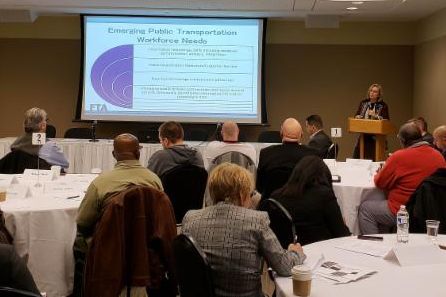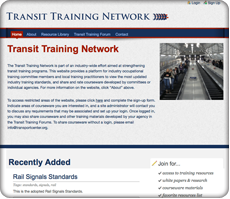News
Frontline Transit Workforce Training Needs Panel
Posted January 2019

Mary Leary, Assistant Director of the Office of Research at the Federal Transit Administration, Presented at the recent Frontline Workforce Panel
In December, the National Transit Institute (NTI) and the Transportation Learning Center worked together to convene a two-day gathering of more than two dozen labor and management representatives from transit to discuss frontline workforce training needs. The Federal Transit Administration encouraged this effort as part of its ongoing mission to address workforce development as the industry struggles to find qualified transit vehicle operators and technicians. The ATU’s Tommy Douglas Conference Center served as the site for the gathering.
While most of the two days involved small group discussions, the conference opened with presentations that provided some basic background. Billy Terry, Executive Director of NTI welcomed participants, gave an overview of the agenda and introduced both Robert Molofsky, General Counsel of the ATU and Mary Leary, Assistant Director of the Office of Research at the Federal Transit Administration. Center Deputy Director Xinge Wang and Executive Director Jack Clark offered views on the extent of the workforce skills crisis and informed the audience of some innovative programs to address frontline training needs that included a variety of training consortia and apprenticeship programs. John Ladd of the US Department of Labor Office of Apprenticeship provided an overview of how much registered apprenticeship has grown in recent years. From the Office of Career, Technical and Adult Education at the US Department of Education, Robin Utz gave the audience a comprehensive look at how the federal picture on career and technical education is changing and can offer resources for training. Janet Weisenford from ICF and Alex Bond from the Eno Center for Transportation both shared insights from extensive research on best practices in transit training.
Several important themes emerged from the presentations and discussions:
At its current levels, training in transit doesn’t begin to fill the needs for addressing current and future workforce needs
Most training occurs within transit agencies, most of which have no formal training programs; external training falls short of needs
Learning from peers and learning on the job in a structured manner offer promising approaches but require more attention and funding to support
Sharing training resources is an effective way to expand training in a cost-effective manner but more is needed to promote sharing.
More needs to be done to assist agencies in their efforts to recruit the next generation of frontline workers; other industries looking to pull from the same shrinking pool of workers are far more aggressive and successful.
